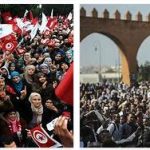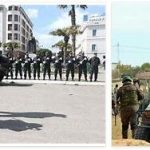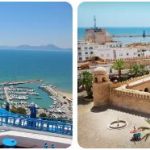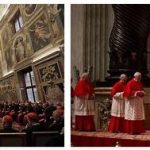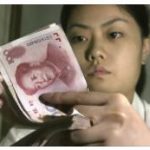Tunisia is the only country that has managed to build a functioning democracy in the wake of the far-reaching upheaval in North Africa and the Middle East , better known as the Arab Spring. On 9 October 2015, the National Dialogue Quartet was awarded the Nobel Peace Prize .
- Who are this year’s Peace Prize winners?
- Why did they receive the Peace Prize?
- How does Tunisia stand out in the Middle East and North Africa?
- What challenges does the Tunisian government still face?
The quartet consists of various civil society organizations, such as the trade union movement UGTT, the employers’ organization UTICA, the human rights organization LTDH and the national bar association ONAT. The award was given on the basis of the quartet’s decisive contribution to building a pluralistic democracy in Tunisia in the wake of the 2011 Jasmine Revolution .
2: History after 2010
The Arab Spring was triggered in 201 1 as a direct result of the uprising in Tunisia , better known as the Jasmine Revolution. The riots in Tunisia started on December 17 when a 26-year-old vegetable trader set himself on fire because he was refused to sell his goods. The man was immediately sent to a hospital in Tunis, but died of his injuries on January 4. The suicide sparked a popular uprising against Tunisia’s authoritarian President Ben Ali. People took to the streets to protest against, among other things, high unemployment, corruption, rising food prices and lack of freedom of expression.
The Jasmine Revolution resulted in Ben Ali and his family fleeing the country after 23 years in power. The revolution triggered an important, but challenging, transition process with the aim of establishing a well-functioning democracy in Tunisia. In October 2011, a Constituent Assembly was elected to draft a new constitution , and the Islamist party Ennahda formed a temporary transitional government along with two smaller, secular parties.
The constitution was initially to be completed within one year. The politicians temporarily failed to agree on the content, and the constitutional negotiations were extended. There was particular political disagreement between the Islamic and the secular side over the issues of women’s rights and the role that Islam should play in society. After two secular political opponents, Mohamed Brahmi and Chokri Belaid, were killed in February and July 2013, respectively, a political crisis arose that led to large-scale civilian demonstrations.
The secular opposition party Nidaa Tounes suspected that Islamic extremists were behind the attacks on Brahmi and Belaid , and also accused the Islamist and government party Ennahda of being allied with these militant extremist groups. Ennahda distanced itself from these accusations; nevertheless, strong political frictions arose.
3: 2013: The quartet establishes the forum National Dialogue
In the face of intense pressure from Tunisian civil society, the political parties eventually managed to put differences aside. According to Allcitycodes, the National Dialogue Forum was established under the auspices of the four voluntary organizations that make up the Quartet . The trade union movement UGTT played a particularly successful role as a mediator between the political parties, and the negotiations ended with agreement on the necessary steps towards a new parliamentary and presidential election.
The National Dialogue managed to produce the necessary agreement on how the constitution should be finalized, in addition to getting Ennahda to hand over power to a technocratic government. By ensuring that Islam was given a place in the constitution , even though it was a more limited place than Ennahda actually wanted, Ennahda agreed to hand over power to a technocratic government.
Ennahda’s support for these far-reaching compromises with the opposition probably saved Tunisia from a new revolution. At the end of the year, the parties also agreed to prepare an action plan . An interesting result of this political power struggle was that youth groups, business organizations, trade unions and other secular forces felt represented in the political processes that emerged after the overthrow of the Ben Ali regime. This inclusion of young people and civil society in policy-making after the revolution – often those who had been at the forefront in the beginning – was absent in the other countries associated with the Arab Spring, especially Egypt.
After months of conflict between Islamist and secular forces, the new constitution was finally adopted in January 2014 by 200 votes to 12, with only four abstentions. In this way, the law also became a clear signal of stable political development.
The constitution is basically considered to be very democratic and human rights-friendly . Among other things, it ensures basic human rights and equality between women and men in all legislative assemblies. The executive branch is otherwise divided between the prime minister and the president. The Prime Minister will have the greatest influence, while the President is responsible for foreign and defense issues. The Constitution does not mention Islam as legislative, but prohibits “attacks on the sacred,” which can be interpreted broadly. However, it has been criticized because it does not prohibit the death penalty and because it has elements that restrict freedom of expression. This shows that Tunisia’s new constitution has its weaknesses. Nevertheless, there is broad agreement that it ensures human rights and a more democratic system of government in the country. The constitution is also highlighted as proof that democracy is compatible with Islam and can be rooted in the Arab world.
In line with previous negotiations, Ennahda handed over power to a technocratic government, with Moncef Marzouki at the helm as interim president. In March 2014, Marzouki lifted the state of emergency that had prevailed over the country since the uprising in 2011, and in May a new election law was passed. It states that the new parliament shall be elected by proportional representation and that the president shall be elected by majority vote .
In October 2014, parliamentary elections were held which the secular party Nidaa Tounes won . A few months later, Nidaa Tounes’ presidential candidate, Beij Caid Essebsi , became the newly elected president of Tunisia and was congratulated by outgoing President Moncef Marzouki. According to international observers, the presidential election was peaceful and democratic.
4: The role of the quartet
The quartet has basically played two key roles:
- They were strong proponents of regime change, while at the same time helping to overthrow Ben Ali. When ambiguities arose about who should govern the country, the quartet ensured that political opponents in the country resolved conflicts and disagreements through dialogue . In this way, it has been absolutely crucial for the political parties to be able to consult with the quartet. In other words, the National Dialogue Quartet has ensured political dialogue, ensuring that no one overthrew the democratic processes in Tunisia in the space of power under the Ben Ali regime. In this way, the quartet has played a crucial role in the democratization of the country.
- The quartet has also been the voice of the people in Tunisia, and the quartet’s central role during the revolution has illustrated how important it is that civil society organizations are well rooted in society to ensure and facilitate democratic processes.

